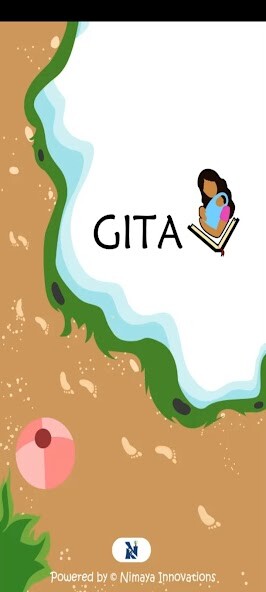We provide GITA online (apkid: com.vishakha.vm2) in order to run this application in our online Android emulator.
Description:

Run this app named GITA using MyAndroid.
You can do it using our Android online emulator.
Chapters summary
Chapter\tTitle\tVerses
1\tArjuna's Vishada Yoga\t46
2\tSankhya Yoga\t72
3\tKarma Yoga\t43
4\tJnana Yoga\t42
5\tKarma-Sanyasa Yoga\t29
6\tAtma Samyama -Yoga\t47
7\tVijnana Yoga\t30
8\tAksara-ParaBrahma Yoga\t28
9\tRaja-Vidya-Raja-Guhya Yoga\t34
10\tVibhuti-Vistara Yoga\t42
11\tViswarupa-Darsana Yoga\t55
12\tBhakti Yoga\t20
13\tKsetra-Ksetrajna Vibhaga Yoga\t35
14\tGunatraya-Vibhaga Yoga\t27
15\tPurushottama-Prapti Yoga\t20
16\tDaivasura-Sampad-Vibhaga Yoga\t24
17\tShraddhatraya-Vibhaga Yoga\t28
18\tMoksha-Sanyasa Yoga\t78
Total\t700
Bhagavad Gita
Srimad Bhagavad Gita
Krishna tells Gita to Arjuna.jpg
Bhagavad-Gita's revelation.
Information
Religion\tHinduism
Author\tVyasa
Language\tSanskrit
Period\t2nd century BCE
Chapters\t18
Verses\t700
The Bhagavad Gita (/bvd it, -t/; Sanskrit: , IAST: bhagavad-gt /bd it/, lit.
"The Song of God"),[1] often referred to as the Gita, is a 700-verse Hindu scripture that is part of the epic Mahabharata (chapters 2340 of Bhishma Parva), commonly dated to the second century BCE.
The Gita is set in a narrative framework of a dialogue between Pandava prince Arjuna and his guide and charioteer Krishna.
At the start of the Dharma Yudhha (righteous war) between Pandavas and Kauravas, Arjuna is filled with moral dilemma and despair about the violence and death the war will cause in the battle against his own kin.[2] He wonders if he should renounce and seeks Krishna's counsel, whose answers and discourse constitute the Bhagavad Gita.
Krishna counsels Arjuna to "fulfill his Kshatriya (warrior) duty to uphold the Dharma" through "selfless action".[web 1][3][note 1] The KrishnaArjuna dialogues cover a broad range of spiritual topics, touching upon ethical dilemmas and philosophical issues that go far beyond the war Arjuna faces.[1][4][5]
Numerous commentaries have been written on the Bhagavad Gita with widely differing views on the essentials.
According to some, Bhagavad Gita is written by Lord Ganesha which was told to him by Vyasa.
Vedanta commentators read varying relations between Self and Brahman in the text: Advaita Vedanta sees the non-dualism of Atman (soul) and Brahman (universal soul) as its essence,[6] whereas Bhedabheda and Vishishtadvaita see Atman and Brahman as both different and non-different, while Dvaita Vedanta sees dualism of Atman (soul) and Brahman as its essence.
The setting of the Gita in a battlefield has been interpreted as an allegory for the ethical and moral struggles of the human life.
Chapter\tTitle\tVerses
1\tArjuna's Vishada Yoga\t46
2\tSankhya Yoga\t72
3\tKarma Yoga\t43
4\tJnana Yoga\t42
5\tKarma-Sanyasa Yoga\t29
6\tAtma Samyama -Yoga\t47
7\tVijnana Yoga\t30
8\tAksara-ParaBrahma Yoga\t28
9\tRaja-Vidya-Raja-Guhya Yoga\t34
10\tVibhuti-Vistara Yoga\t42
11\tViswarupa-Darsana Yoga\t55
12\tBhakti Yoga\t20
13\tKsetra-Ksetrajna Vibhaga Yoga\t35
14\tGunatraya-Vibhaga Yoga\t27
15\tPurushottama-Prapti Yoga\t20
16\tDaivasura-Sampad-Vibhaga Yoga\t24
17\tShraddhatraya-Vibhaga Yoga\t28
18\tMoksha-Sanyasa Yoga\t78
Total\t700
Bhagavad Gita
Srimad Bhagavad Gita
Krishna tells Gita to Arjuna.jpg
Bhagavad-Gita's revelation.
Information
Religion\tHinduism
Author\tVyasa
Language\tSanskrit
Period\t2nd century BCE
Chapters\t18
Verses\t700
The Bhagavad Gita (/bvd it, -t/; Sanskrit: , IAST: bhagavad-gt /bd it/, lit.
"The Song of God"),[1] often referred to as the Gita, is a 700-verse Hindu scripture that is part of the epic Mahabharata (chapters 2340 of Bhishma Parva), commonly dated to the second century BCE.
The Gita is set in a narrative framework of a dialogue between Pandava prince Arjuna and his guide and charioteer Krishna.
At the start of the Dharma Yudhha (righteous war) between Pandavas and Kauravas, Arjuna is filled with moral dilemma and despair about the violence and death the war will cause in the battle against his own kin.[2] He wonders if he should renounce and seeks Krishna's counsel, whose answers and discourse constitute the Bhagavad Gita.
Krishna counsels Arjuna to "fulfill his Kshatriya (warrior) duty to uphold the Dharma" through "selfless action".[web 1][3][note 1] The KrishnaArjuna dialogues cover a broad range of spiritual topics, touching upon ethical dilemmas and philosophical issues that go far beyond the war Arjuna faces.[1][4][5]
Numerous commentaries have been written on the Bhagavad Gita with widely differing views on the essentials.
According to some, Bhagavad Gita is written by Lord Ganesha which was told to him by Vyasa.
Vedanta commentators read varying relations between Self and Brahman in the text: Advaita Vedanta sees the non-dualism of Atman (soul) and Brahman (universal soul) as its essence,[6] whereas Bhedabheda and Vishishtadvaita see Atman and Brahman as both different and non-different, while Dvaita Vedanta sees dualism of Atman (soul) and Brahman as its essence.
The setting of the Gita in a battlefield has been interpreted as an allegory for the ethical and moral struggles of the human life.
MyAndroid is not a downloader online for GITA. It only allows to test online GITA with apkid com.vishakha.vm2. MyAndroid provides the official Google Play Store to run GITA online.
©2025. MyAndroid. All Rights Reserved.
By OffiDocs Group OU – Registry code: 1609791 -VAT number: EE102345621.